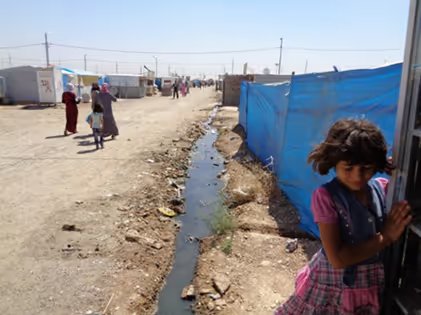Erbil‚ 13th April 2017

Arriving in Kurdish Iraq’s administrative capital by plane is little more complicated than stepping off a bus – passport control and customs accepted. From the arrivals hall, a short bus ride from the terminal, the city stands a little way off, a line of growing office blocks hedged against the hazy backdrop of a thick grey sky. The obvious security presence seems no more elevated than that at many airports. Passengers come and go, pouring out of cream or blue and white taxis or being met and whisked away by families. It’s all pretty normal.
Andrew and I met and are driven into town by Iqbal, a former part-time footballer from Mosul, who at 29 has seen his sporting career finished by the destruction of large parts of his city in the conflict with Daiesh, including the football club. 88km to the south, Mosul is a short drive from Erbil. We’ll be heading in the opposite direction, to the region around Dohuk, visiting two camps for displaced people. Our local guide, Mahmoud, will be joining us on the journey tomorrow and will introduce, interpret and guide us around the camps.
Meanwhile, we book into the stylish ‘Classy’ hotel in downtown Erbil. Nothing seems too much trouble for the helpful staff of this establishment, and with its walls lined with photos and details of tourist sites around the region it could be just the place to start a memorable holiday.
We’re here for something quite different, however. Our fact-finding mission will, we hope, identify where sustainable drainage practices could improve water management, agroecology and the environment of camps in general; and establish what pattern ongoing research could take to explore the idea. It’s going to be a practical project, and an inclusive one: to work it will need the engagement of camp residents and management, drawing on their experience of local conditions as well as any expertise in food production latent in their communities. One thing we’re agreed on is that we’re not planning to promote solutions that result in standing water, with its attendant health risks in settlements under-supplied by sanitation.
I’m also keen to dispel any suggestion that I’m an expert designer who will solve whatever drainage problems being experienced in the camps. There may be some opportunity to help figure those sorts of challenges out but the last thing I wish to do is arrive with preconceived ideas of the particular techniques and strategies that will do the job. For sure, Andrew and I discuss a number of practical possibilities but really that’s more about getting in the mood than devising an approach. In design terms I’m first and foremost a landscape architect – a discipline that relies upon and gathers expertise from a number of quarters (including users and community groups) to produce designs that function holistically.
After that I’m an enthusiast of the ideas and philosophy that have made permaculture a powerful tool for addressing design challenges of whatever sort creatively and positively. Intrinsic to that approach is taking small steps initially, working alongside and in the interests of the people who will use the design, and growing those solutions that work as one’s knowledge of a problem and the environment in which it exists and develops. With such an approach, there can be no external experts – only interactive learners.
If stepping off the plane was typically simple, buying a sim card turns out to be unusually complex. Here, one must produce a passport, have it copied, the copy scanned, provide a thumbprint and be photographed, all in the interests of security. This attention to security, seen most obviously in the guards on every street corner, may be how the Kurdish authorities have kept the number of serious incidents to an impressive minimum since the establishment of the semi-autonomous region in 2003. I certainly feel both relaxed and welcome on the streets in Erbil and look forward to discovering more of Kurdish culture in the new few days.
For now, however, it’s the best Moussaka I can remember in the hotel’s excellent Greek restaurant and after a couple of long days’ journeying, an early night.
See the next blog in the diary.
Stay updated
Sign up for our newsletter to receive regular updates on resources, news, and insights like this. Don’t miss out on important information that can help you stay informed and engaged.
Explore Elrha
Learn more about our mission, the organisations we support, and the resources we provide to drive research and innovation in humanitarian response.


.png)